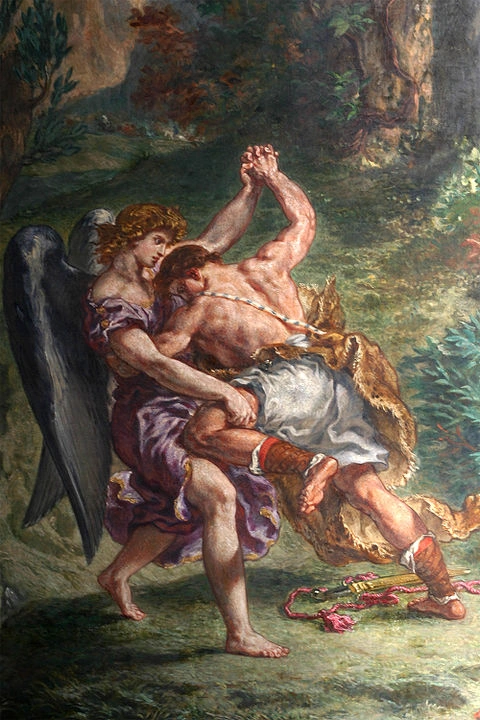9373. Come up unto Jehovah. That this signifies conjunction with the Lord, is evident from the signification of “coming up,” as being to be raised toward interior things (see n. 3084, 4539, 4969, 5406, 5817, 6007), consequently also to be conjoined (n. 8760). That it denotes conjunction with the Lord, is because by “Jehovah” in the Word is meant the the Lord, (n. 1343, 1736, 1793, 2004, 2005, 2018, 2025, 2921, 3023, 3035, 5663, 6280, 6303, 6905, 8274, 8864, 9315). A secret which also lies hidden in the internal sense of these words, is that the sons of Jacob, over whom Moses was the head, were not called and chosen; but they themselves insisted that Divine worship should be instituted among them (according to wh at has been said in n. 4290, 4293); and therefore it is here said, “and He said unto Moses, Come up unto Jehovah,” as if not Jehovah, but another, had said that he should come up. For the same reason in what follows it is said that “the people should not go up” (verse 2); and that “Jehovah sent not His hand unto the sons of Israel who were set apart” (verse 11); and that “the appearance of the glory of Jehovah was like devouring fire on the top of the mountain in the eyes of the sons of Israel” (verse 17); and lastly that Moses, being called the seventh day, “entered into the midst of the cloud.” For by “the cloud” is meant the Word in the letter (n. 5922, 6343, 6752, 6832, 8106, 8443, 8781); and with the sons of Jacob the Word was separated from its internal sense, because they were in external worship without internal, as can be clearly seen from the fact that now, as before, they said, “all the words which Jehovah hath spoken we will do” (verse 3); and yet scarcely forty days afterward they worshiped a golden calf instead of Jehovah; which shows that this was hidden in their hearts while they were saying with their lips that they would serve Jehovah alone. But nevertheless those who are meant by “the called and the chosen” are those who are in internal worship, and who from internal worship are in external; that is, those who are in love to and faith in the Lord, and from this in love toward the neighbor.
Fake It Until You Make It
作者: Todd Beiswenger

聞きながらブラウジングを続けるには、新しいウィンドウでオーディオを再生して下さい。
When we decide that we want a new life, we have to LIVE it. Sometimes this means we're faking our responses and actions, but as long as we're faking it with the intention to make it, God will turn that fake feeling into a real one.
(参照: Arcana Coelestia 4281, 6592, 8389, 8588; Conjugial Love 281; Genesis 32:22-31, 50:24-25)
Arcana Coelestia#8760
8760. 'And Moses went up to God' means the truth from God which was below heaven joining itself to Divine Truth in heaven. This is clear from the representation of 'Moses' as the truth from God, dealt with in 6771, 6827, 7014, at this point the truth from God which was below heaven, since he now represents the children of Israel as their head, and so represents those belonging to the spiritual Church not yet in heaven because they are not as yet governed by good formed from truths, 8753, 8754; and from the meaning of 'going up' as joining oneself to, for someone who goes up to the Divine joins himself to Him, even as the words 'going up into heaven' mean man's being joined to the Lord, and the words 'coming down from heaven' mean His being joined to man. Divine Truth in heaven, to which the other was joined, is what 'God' is used to mean; for in the Word the Lord is called 'God' by virtue of Divine Truth, and Jehovah' by virtue of Divine Good, 2586, 2769, 2807, 2822, 3921 (end), 4402, 7010, 7268, 7873, 8301. And since the joining of Divine Truth to Divine Good is the subject here, this verse first says 'God', then 'Jehovah' just after, in these words, And Moses went up to God, and Jehovah called to him from the mountain.
[2] The expression Divine Truth in heaven is used, and then Divine Good in heaven, because the Divine Himself is far above the heavens; not only Divine Goodness itself is far above them but also Divine Truth itself which goes forth directly from Divine Good. The reason why they are far above heaven is that in Himself the Divine is the Infinite, and the Infinite cannot be joined to finite beings, thus not even to angels in heaven, unless He puts on some finite clothing and in that way adapts Himself for reception. Also Divine Good as it exists in itself is a flame of infinite intensity or love, a flame which no angel in heaven can bear; for he would be devoured by it, as a person in the world would be if the flame of the sun were to reach him without anything between them to moderate it. The light also from the flame of God's love, which is Divine Truth, would blind all who are in heaven if it were to flow in without abatement of its fiery brightness. All this goes to show what the difference is between Divine Good and Divine Truth that are above the heavens and Divine Good and Divine Truth in the heavens, which are the subject here.






